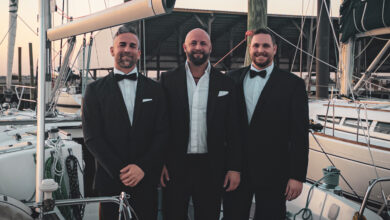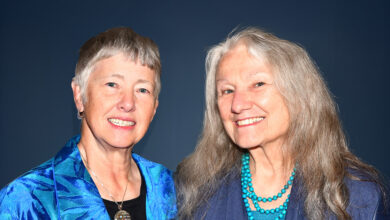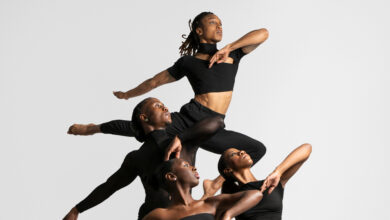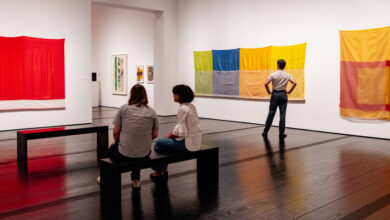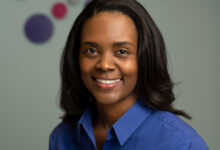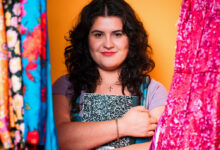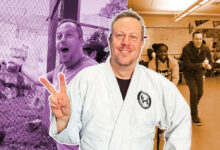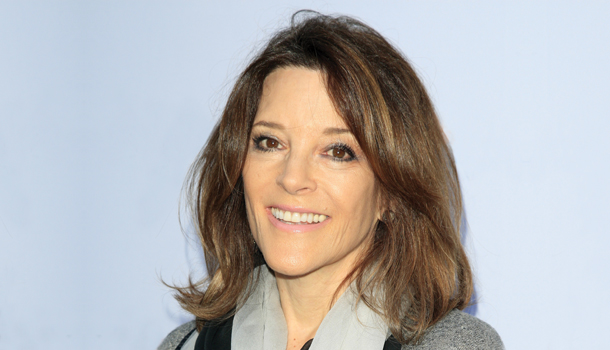
Spoken Like a True Texan: Author Marianne Williamson On Politics, Gay America, and Growing Up in Houston
By Shirley Knight
“I feel strongly about gay marriage,” Marianne Williamson says. “I don’t think gay people deserve to be married because they’re gay. They deserve to be married because they’re American. ‘Life, liberty, and the pursuit of happiness’ if you’re American—what else is there to discuss?” Williamson is a best-selling author and sought-after speaker who garners national and international attention.
“I am a romantic about America,” she says. “Take gay people—despite America’s problems, how can you compare being gay here to being gay in Uganda?” For her, the American dream is that any of us “can live our lives as long as we’re not hurting anyone else.” In 2014, Williamson ran for congress in California. It was her first campaign and a professional politician won the race, but Williamson says the experience didn’t leave her cynical about politics.
“Every generation of Americans has to rediscover our passion for democratic possibility. “Exceptionalism cannot be bequeathed from one generation to another,” she says. She also exhorts people to appreciate “the blessings of American democracy and liberty, and the extraordinary sacrifices made by people throughout our history to ensure those liberties.”

To those who are disillusioned by or disinterested in politics, Williamson says, “Not voting is a vote. When there’s low voter turnout, Republicans win. When there’s high voter turnout, Democrats win, in general. If you think that by not voting you’re rebelling against the system, you’re fooling yourself. If you’re not voting, you’re voting Republican. And in this election, if you’re not voting, you’re voting for Trump.”
Six of Williamson’s books have been on the New York Times best-seller list, including four that reached number one. Newsweek magazine has named her one of the 50 most influential baby-boomers. Her message includes encouraging people to find and follow their own internal guidance. “[You might] feel passionate about animal rights,” she says. “Well, that’s your assignment. Another person feels passionate about filmmaking—that’s their assignment.
“Issues are going to come up in your life where you need to forgive,” she says, “where you need to atone, where you need to take responsibility for your life, where you need to clean up some mess in your life, where you need to make some apology, make some amends, deal with some character defects. And the more you purify your own heart, the more you will know where you can and should make a difference.”
In her talks across the country, Williamson is encouraging people to “stop answering the call of the cell phone and start answering the call of the ages. We are so bombarded with distracting impulses today,” she says. An alternative is to get involved in “great and noble things. To read a great novel, to listen to great music, to cultivate enrichment does something to you,” she says. “There’s a lot of information available today, and whatever great and noble thing you’re interested in, you can find it.”
Williamson was born and raised in Houston, where she attended public schools: Mark Twain Elementary, Pershing Middle School, and Bellaire High School. Her father was an immigration lawyer, and her mother was involved in volunteer work. “Houston was a smaller city when I was growing up here,” she says. “It wasn’t this sprawling metropolis that it is now. It was big enough to be sophisticated, but small enough to feel containable.
“Houston is a totally cool world-class city,” she says. “It’s a progressive city. It doesn’t at all fit some of the stereotypes that some people have about Texas. When people say to me sometimes, in my work, ‘You don’t seem like a Texan,’ I have said, ‘No, I am totally Texan. This is a Texan. Barbara Jordan came from Texas. Jim Hightower came from Texas. Ramsey Clark [the U.S. attorney general under President Johnson] came from Texas. Ann Richards came from Texas. This is Texan. We’re out there saying what we think.’”
In the early ’80s, Williamson left behind singing gigs at Rockefeller’s nightclub and a bookstore she owned in the Heights and moved to Los Angeles. There, she continued practicing and teaching a set of books called A Course in Miracles, which led to her becoming closely aligned with the gay community. It was a time when many young gay men were getting sick and dying. “I think it’s important to keep stories alive,” Williamson says. That time period is “the story of the bravery, the love, and the power activated. Gay America was not a politicized force before the AIDS crisis. We would not have gay marriage today were it not for the AIDS crisis, because that is what led to the politicization, the Human Rights Campaign, and so forth.”
Another lasting effect is that “AIDS profoundly impacted the mainstream medical model in the United States,” Williamson says. “When AIDS began here, Western allopathic medicine had nothing to offer. We celebrate and are grateful for the fact that today it does, but it took them time. When all these people were told, ‘We have nothing to offer, you’re going to die,’ they didn’t just go home to die,” Williamson explains. “That’s when people began seriously investigating all sorts of alternative healing methods. The word then was ‘alternative,’ then it moved to ‘complementary,’ and now it has landed where it belongs at ‘integrative.’ The whole integrative medical model emerged the way it has in the United States, and has become such a staple of our mainstream understanding, because of a particular crisis where allopathic medicine had no more cards to play.”
Williamson says, “I think a part of conscious and mature living is the development of a sense of responsibility to your ancestors—to those who came before you, as well as to those who will come after you—to know the history of your tribe and to claim appropriate pride in the bravery of your people.” Williamson says it’s important to keep in mind “both the things that need to be addressed and the things that have progressed. That’s what keeps you from being cynical or angry, and to know you need to keep working.
“Any time there’s social movement forward, there’s pushback,” she adds. “That’s part of a mature understanding. It’s unbelievable the progress that’s been made, but we’re not all the way there. The great cathedrals of Europe took hundreds of years to build. All of the artisans and the stoneworkers and the painters and the bricklayers knew that the work would not be completed in their lifetime, but their love lifted them up and carried them above their self-centered concern about whether or not they would ever see the job complete.” She quotes Jewish philosopher Rabbi Tarfon who said, “You are not obliged to complete the work, but neither are you allowed to evade it.”
Williamson says she remembers saying to people, “‘Before the AIDS crisis, you [probably] weren’t known for voting for the underdog because it hadn’t come home to you.’ At an immature level of social and political development, we vote for our pocketbook. At a more evolved level, we vote for issues of social justice because, as they say in Judaism, they might not be coming for us this generation, but it could happen at any time.”
Williamson says our challenge now is “to develop political, educational, social, and economic systems that promote and foster the better angels of our nature.” She says we are more than “economic beings who need to compete with each other to get ahead.” Instead, we can see ourselves as being “in communion with other people and with the planet itself. I’m optimistic, long-term,” she says. “Optimism is a moral imperative. Long-term, I know it’s going to be glorious. I just know it is.”
Marianne Williamson was in Houston on May 14 to speak at the Celebrate Your Life conference at Unity of Houston. Her most recent book, Tears to Triumph: The Spiritual Journey from Suffering to Enlightenment, which explores how we respond to times of depression, was released on June 14. For more information, see marianne.com.
Shirley Knight is the founder of awakenow.org.




